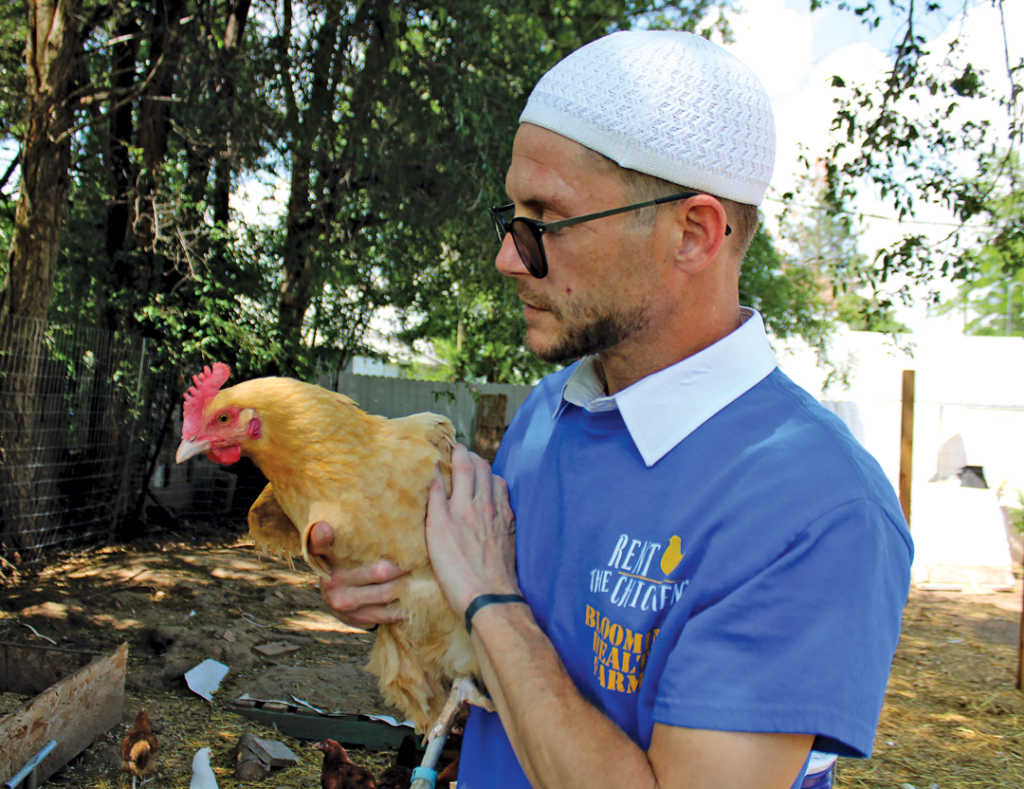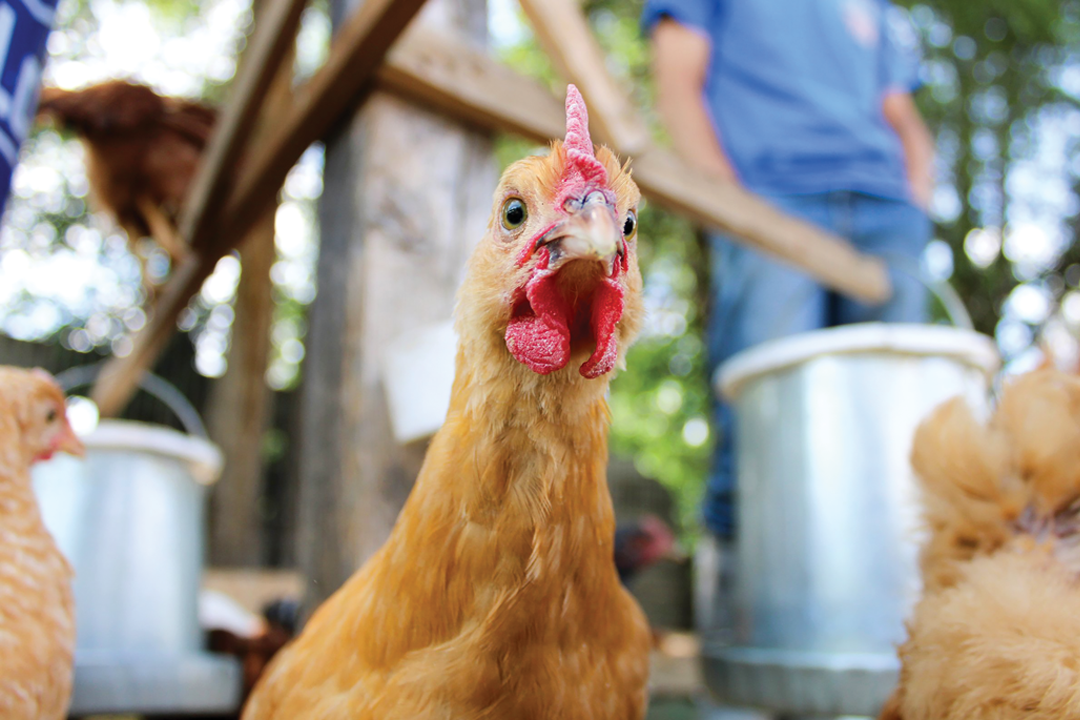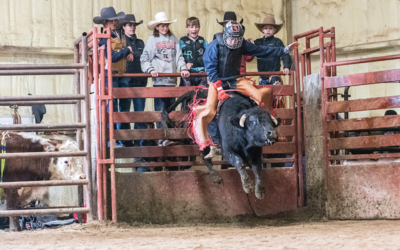You may have already seen some fuzzy yellow chicks for sale if you frequent stores like Northern Colorado Feeders Supply, Poudre Pet or Murdoch’s. And you might be torn.
Those peeping fluffballs are cute. Plus, they might lay “free” eggs. Point for the chickens.
Then again, small, cute things grow, and chickens, just like any other pet, take work. Point against the chickens. What’s the tiebreaker? Perhaps renting them.
Blooming Health Farms, a Greeley-based nonprofit, offers chicken rentals—coop included.
Blooming Health Farms partners with Rent the Chicken, a national franchise. The idea is to let people test out what it’s like to take care of chickens before they fully commit to buying them.

Sean Short, co-founder of Blooming Health Farms. Photo by Kelly Ragan.
Reasons to rent chickens
Chicken rental programs can help keep the animals out of shelters, according to an article by Backyard Poultry Magazine. Many folks buy chicks without fully thinking it through, because they’re cute, mostly, or because they think it could be a good educational experience.
Sometimes people need to move and can’t take their chickens with them. Sometimes neighbors object. Sometimes people just discover that caring for poultry is more of a commitment than they are willing to make.
Through Rent the Chicken, you can keep the animals for about six months. Then, if you decide chickens are your calling, you can adopt them and keep the coop for an additional fee. Chicken rentals are available from April through October or May through November.
There are legitimate reasons to keep chickens. According to a report by The New York Times, the demand for backyard chickens spiked in 2023, driven in part by inflation and a desire to be more self-sufficient. Egg prices, especially in Colorado, have been volatile in the last few years, not to mention supply issues caused by an avian flu outbreak among Colorado flocks from 2022-23. According to the Times, the pandemic also spurred an interest in learning to grow and raise food at home.
Blooming Health Farms’ standard rental package starts at $495 for one season. The fee includes the delivery, setup and pickup, two egg-laying hens, one standard chicken coop, a food dish and water dish, chicken feed and a couple guides on how to care for chickens.
Blooming Health Farms co-founder Sean Short delivers the chickens in Greeley, Fort Collins and much of Boulder. Rent the Chicken provides the animals and materials, while Blooming Health Farms houses them and delivers them to people who sign up for the rental program. With the standard rental package, folks can expect about 8-14 eggs per week.

Photo by Kelly Ragan.
A way to help at-risk youth
Short got hooked on chickens the way many people do: He happened upon baby chicks for sale. At the time, he was focused on building an aquaponics farm that specialized in growing tomatoes and sprouts while helping at-risk youth develop job skills.
He hopes the chicken rentals—and a hatchery program for schools and libraries—will be a boon to Blooming Health Farms. The chickens have already been a positive experience for the at-risk youth he works with. He and the kids even take trips to the Greeley Farmers Market to sell eggs and learn about agricultural entrepreneurship.
Short didn’t always think of himself as someone capable of helping at-risk youth find their way. He used to be one of the delinquents, he says.
The Greeley native earned a degree in molecular biology from the University of Hawaii in 2013, but there’s a gap between the year he graduated and when he got his life together, he says. After three DUIs and jail time, he had trouble finding a stable job in the field he loved.
He eventually got sober after he found himself at his lowest, he says. While in a jail cell, he tried to take his own life because he thought he’d spend the rest of it in prison.
“The failed attempt transformed me, and I promised myself I would do whatever it took to be a better man,” he says.
In the midst of getting sober, Short lost both of his brothers to addiction. That strengthened his resolve not only to stay sober, but to be an advocate for others. Now sober since April 2017, he’s passionate about helping youth avoid going down that same path.
“I used to be one of those kids,” he says. “I know what kind of impact something like Blooming Health Farms can have.”
Rules for keeping backyard chickens
Local chicken ordinances vary, and so does enforcement. If you’re interested in getting backyard chickens, it’s a good idea to double-check your city’s regulations and any guidelines your neighborhood or HOA has before getting invested. Here are some general rules.
Fort Collins requires folks outside areas not zoned for farm animals (aka most residential areas) to get a permit through NOCO Humane to have chickens and ducks. Applicants must also pass an onsite inspection.
Loveland allows all domesticated fowl if the animals and their enclosures are well-maintained and don’t become a disturbance to neighboring properties, according to NOCO Humane.
Johnstown allows all backyard poultry as long as their enclosures provide at least 100 square feet of space per animal. Johnstown also places the limit at no more than four pets or fowl at one property unless it’s one acre or larger and meets certain requirements.
Windsor allows anyone with a permit to keep up to six chicken hens. Timnath requires folks keeping chickens or ducks in areas not zoned for farm animals to get a permit through NOCO Humane. They must also adhere to enclosure, care and location requirements. Permits allow up to six chicken hens, and roosters are prohibited.
Wellington allows up to 12 chickens at one property as long as their enclosure and coops comply with space requirements. According to town ordinances, small livestock, including fowl, must have an enclosure of at least nine square feet per animal, not counting a shed, shelter or coop, which needs to provide a minimum of two additional square feet per animal. Wellington prohibits peacocks, guinea fowl, ganders and roosters.
Greeley (yes, Greeley) does not allow backyard chickens. Don Threewitt, the city’s deputy director of community development, says that no more than 10 chickens are allowed per acre on land specifically devoted to animal use.
“This essentially prohibits backyard chickens for Greeley residential properties,” Threewitt says. “We do have some community interest in keeping layer hens and have advanced backyard chicken proposals twice in the recent past, similar to what other Northern Colorado communities have adopted. Neither initiative was successful.”
However, if you drive around Greeley, you will see plenty of backyard chickens and hear the occasional rooster. If your chickens are quiet and your neighbors aren’t nosy, you might get away with it.







